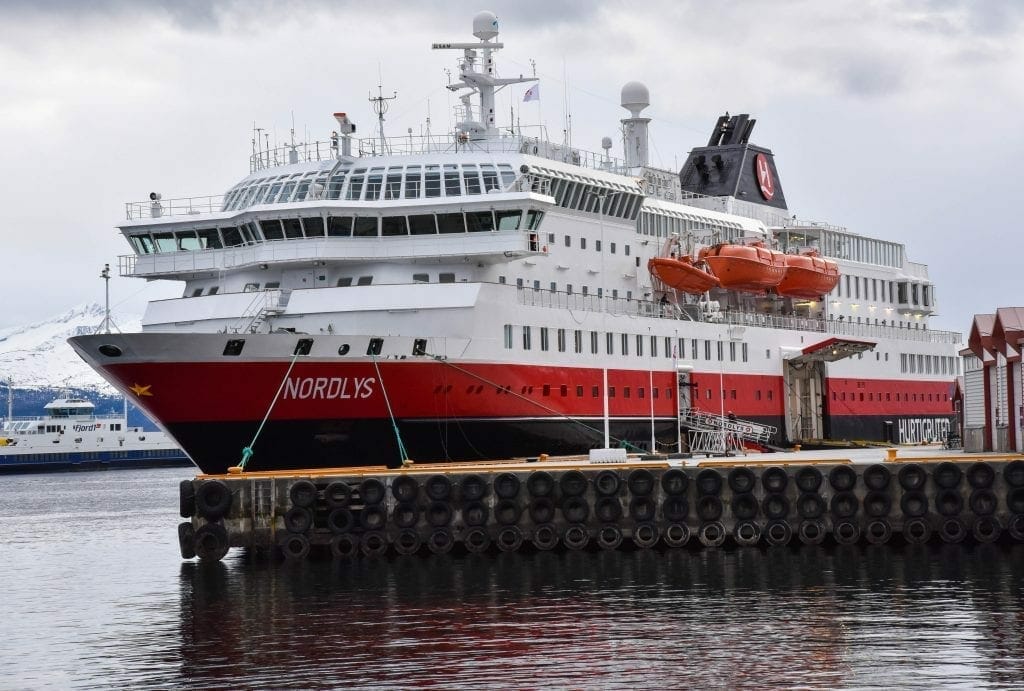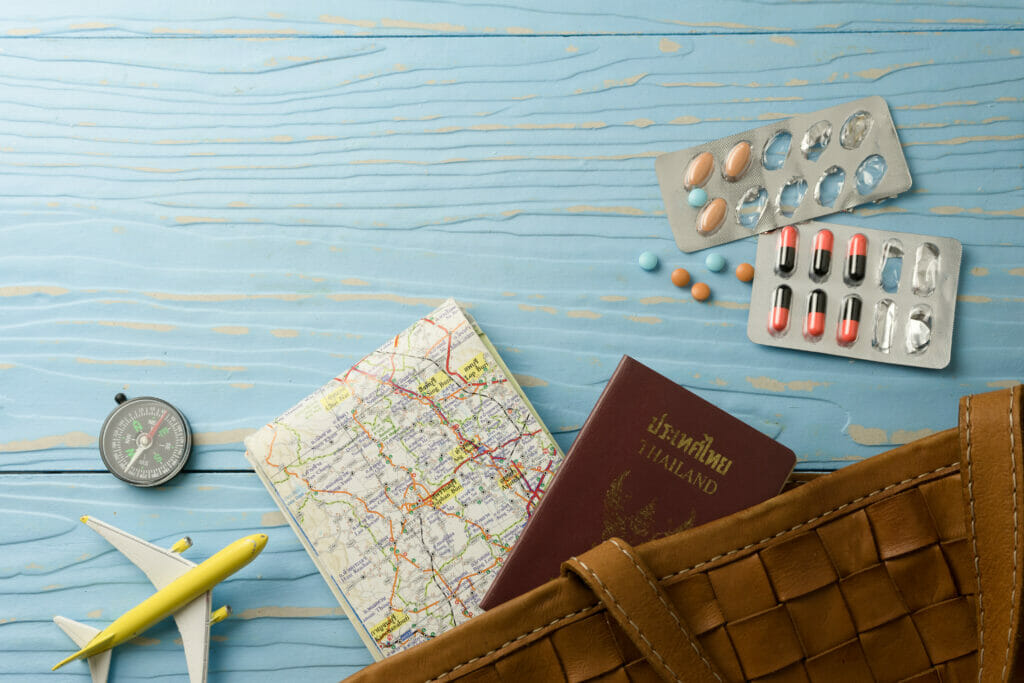“Seasickness in itself is not contagious, but I’m pretty sure that puking is extremely contagious.”
Ray Palla Krill America
In 2024, an estimated 36 million people worldwide embarked on a cruise, yet many still avoid them due to the fear of seasickness. Seasickness, a form of motion sickness, can quickly transform a dream ocean voyage into a nightmare. Nausea, dizziness, and overwhelming discomfort make it nearly impossible to enjoy the stunning views, great food, or the excitement of being at sea. For years, I battled severe motion sickness, trying every remedy I could find—natural solutions, over-the-counter medications, and even prescription treatments. But nothing worked. Some left me drowsy, while the scopolomine patch made me feel off for weeks after disembarking. And this was all while cruising on calm seas.
I had an adventurous Hurtigruten winter cruise through the wild, unpredictable seas of Norway on my agenda to view the Northern Lights. As the trip approached, I knew I needed a solid solution to ensure a safe and enjoyable journey. After conducting extensive research, I discovered something genuinely life-changing, something that would not only enhance my experience but open the door to countless future sea adventures. I’m excited to share this discovery with you.
Conquering Seasickness: My Journey from Fear to Relief


I had a long history of car sickness, but it wasn’t until my first cruise in my mid-20s that I discovered how I could not handle being at sea. Over the next 20 years, I tried two more cruises, and even though I had never been on the open water or in rough seas, I was sicker each time. My physician gave me a prescription for a Scopalomine Patch, which reduced the severity, but the seasickness never went away, and I had to be in a room with a window at all times. The side effects from the patch were miserable, too. I thought after that I would never be sea-worthy.
In 2020, friends invited my husband and me to join them on a winter cruise to the Norway Coast. The coast is famous for severe seas, and I was terrified. To say I was torn was an understatement, but in the end, my desire to travel overrode my fear.
Well, sort of.
For several months, I agonized over my choice to the point that my family would say, “Just don’t go.” I am not a quitter, so I did the next best thing: I researched the hell out of how to deal with seasickness. I am a research nurse, and I knew that if I delved into medical research on the topic, I would find an answer. That answer turned out to be a miracle, not only for me but also for others.
Find Great Accommodations for Your Next Trip Booking.com – Expedia
Food Tours & Experiences Get Your Guide – Viator
Travel Insurance Squaremouth.com
Reviews Google Maps
When Scopolamine Made Things Worse
Many people praise scopolamine for preventing seasickness, but for me, it was a nightmare. While on the boat, I never entirely handled my seas sickness. I hated the dry mouth, grogginess, and inability to enjoy some glasses of wine with dinner. But what came after the boat that was the most difficult. I developed Mal de Débarquement Syndrome (MdDS)—a condition where my brain refused to adjust back to solid ground after leaving a boat. For weeks after the trip, I felt like I was still moving, swaying as if I were at sea. The dizziness and disorientation were so severe that I found it difficult to function in daily life. I could not work or drive. Instead of solving my motion sickness, scopolamine had made it worse. I knew I had to find another solution.
Understanding the Science of Seasickness


Seasickness happens because we’re getting different information going to our brain, and our brain doesn’t know what to do. In other words, the brain receives conflicting signals from other sensory systems responsible for balance:
- The Inner Ear (Vestibular System): Detects motion and balance. On a moving boat, your inner ear senses movement even when you’re sitting still. In our inner ear, there are histamine receptors, so that is how antihistamines work.
- The Eyes (Visual System): Your eyes may see a stable environment (like the inside of a cabin) while your body feels movement, creating confusion.
- Muscles & Joints (Proprioceptive System): Your body naturally adjusts to motion, but when signals from your muscles don’t match what your eyes and ears are telling your brain, nausea and dizziness follow.
Who is Most Likely to Get Seasick?
Some people are naturally more prone to seasickness than others. Factors that influence sensitivity include:
- Personal Susceptibility: Some individuals have a more sensitive inner ear, making them more prone to motion sickness.
- Anxiety or Stress: Worrying about getting seasick can actually make symptoms worse. I sincerely believe that in my decades of nursing experience.
- Rough Waters: Larger waves and unpredictable boat motion increase the likelihood of motion sickness.
- Lack of Acclimatization: Those new to boating may be more affected, but frequent exposure often reduces sensitivity over time.
- Genetics: Studies suggest a hereditary component—if your parents are prone to motion sickness, you may be as well.
The key to overcoming seasickness is finding a way to help your brain resolve these conflicting signals before nausea sets in.
Learn what medications to pack for long flights. Check out our post here.
A Life-Changing Discovery: Meclizine and NASA’s Approach to Motion Sickness


Frustrated with my seasickness struggles, I searched for alternatives. One day, I came across an article discussing how commercial ship crews handle extreme conditions in rough seas. It also mentioned NASA astronauts, who face motion sickness in zero gravity. Their solution? Meclizine with the prescription Phenergan as a backup for breakthrough issues.
I had never seriously considered Meclizine before. But if it worked for astronauts in space and mariners braving stormy waters, I figured it was worth a try.
I also discussed it with my primary care physician, who had never heard of this approach. I am thrilled to tell you that it was a success.
Why Meclizine Works So Well
I decided to put Meclizine to the ultimate test—a voyage through Northern Norway’s Arctic waters, where the seas are notoriously rough. This was likely an unfair test, but my physician did give me a backup in case it failed.
While many passengers skipped meals and spent hours in their cabins trying to recover, I was fine. At times, the dining room had several empty tables, with people too sick to eat, but I never had an issue with enjoying a meal. For the first time, I wasn’t fighting nausea. I wasn’t dizzy or groggy. To my surprise, I felt normal and was actually enjoying the trip. We had nasty weather, too.
Unlike the scopolamine patch, which left me feeling disoriented and nauseous for weeks, Meclizine provided steady relief without any lingering side effects. It blocked the nausea before it could even begin and didn’t leave me feeling “off” when I returned to solid ground. It was the first medication that genuinely allowed me to enjoy being on the water without fear.
A couple of years later, I embarked on a Hurtigruten Expedition cruise, in this case, on more open seas. I again had zero issues. Over the years, I have shared the remedy with others, and the results have been the same. I have also offered Meclizine to bus mates on group trips, and in one case, one of my fellow passengers was suffering so terribly they were tempted to end the trip early. She went from looking green and not able to eat to feeling normal. My son uses it for plane travel.
Meclizine vs. Other Motion Sickness Treatments


Now that I had found my go-to remedy, I wanted to understand why it worked so well for me compared to other options.
Meclizine (Bonine, Antivert)
✔ How It Works: Blocks histamine receptors in the brain that contribute to nausea.
✔ Best For: Preventing motion sickness before it starts. Lasts longer than Dramamine with fewer drowsy side effects.
✔ Why I Prefer It: It stops seasickness before it happens without making me groggy or leaving me off-balance afterward.
Dosing: If you follow the over-the-counter instructions, the dose is one 25 mg pill, usually sublingual once a day. For my husband and others, it seemed to do a great job.
Prescription strength is more often. In my research, it reported that a safe schedule could be 1-2 25 mg pills every 8 hours. The first dose should be taken 1-2 hours before the ship leaves and then taken consistently after that. I took two pills every 8 hours after checking with my physician. I never missed a dose. On my second trip, I took only one pill every 8 hours since the seas were not as rough. I had a smooth travels. There were NO side effects, no grogginess, and no issues once I returned to land.
Why Meclizine is My Travel Essential
Since discovering Meclizine, I have never traveled without it. It’s always in my purse, ready for any situation—whether I’m on a ship, plane, train, or even a long car ride. I have never taken it except on a boat, but I have often shared it with others during travel. Ryan used it several times for train travel in Japan. I no longer fear rough seas or unexpected turbulence since I keep it nearby if needed. For anyone who has struggled with motion sickness, I can’t recommend Meclizine enough.
If you’ve tried other remedies without success, this could be the solution you’ve been searching for. It certainly changed my life—and it just might change yours too. It is worth a try so you don’t miss out on amazing adventures.
In my case, I buy my Meclizine on Amazon. The link provided is for three bottles of 100 pills for about $14. Meclizine can easily be found in most pharmacies, Target, etc. Brand names include Bonine, Antivert, Dramamine, the less drowsy formula, and VertiCalm. In Europe, it can be it is Postafen or Banamine. I suggest buying generic; it is much less expensive. Just look under active ingredients for the name Meclizine.
Dramamine (Dimenhydrinate)
✔ How It Works: Similar to Meclizine but requires more frequent dosing, usually every four hours. You can not take Dramamine and Meclizine at the same time.
✔ Best For: Short-term relief but may cause more sedation.
✔ Why I Skip It: It works well but makes me too sleepy, and you should not drink alcohol with it either. Once, I was at dinner when my next dose was due, and I did not have it on me. Suddenly, not realizing it was due, I became severely nauseous. I barely made it back to my room. It can be purchased on Amazon.
***Please note that there is a Dramamine non-drowsy formula in which the active ingredient is Meclizine***
Prescription Medications
Scopolamine Patch (Transderm Scop)
✔ How It Works: It blocks the action of acetylcholine (a neurotransmitter) and reduces nausea, vomiting, and dizziness. A patch behind the ear that releases medication slowly over 72 hours. You need to place the patch on prior to boarding the ship. Alcohol should be avoided when using the patch.
✔ Best For: Long-duration relief, especially for multi-day cruises.
✘ Why It Didn’t Work for Me: During the cruise, I still had some seasickness. The patch caused Mal de Débarquement Syndrome, leaving me dizzy and nauseous for weeks.
Promethazine (Phenergan)
✔ How It Works: By blocking dopamine (D₂) receptors, it helps prevent nausea and vomiting. It does cause drowsiness, and alcohol should be avoided.
✔ Best For: A prescription antihistamine used for severe nausea and vomiting. Since it is sedating if really not ideal for round-the-clock use. It really should be used for breakthrough nausea and vomiting.
✘ My doctor suggested this as a backup if the Meclizine did not work. I took in once when they warned us the seas would be very severe. I had no issues and even slept through much of the storm
Natural Remedies for Seasickness


For those who prefer non-medicated approaches, several natural remedies have shown promise:
- Ginger: A well-known natural anti-nausea remedy. Available in ginger tea, supplements, or candies. I always bring a bag of ginger chews and ginger tea bags that I buy at Trader Joe’s.
- Peppermint: Can help soothe an upset stomach when consumed as a tea or essential oil.
- Acupressure Wristbands: Designed to apply pressure to the P6 acupressure point on the wrist, which may reduce nausea for some people. I wore these on the Norway cruise but did not on my second one. I bought mine on Amazon.
Behavioral Techniques to Minimize Seasickness
- Choose the Right Spot on the Boat: This is important! Stay near the center of the vessel, where movement is less intense. The closer to the water you are, the better. Yes, the high cabins are usually the most upscale ones, but if the trade-off is seasickness, that is worth it.
- Room with a Balcony: If you are prone to seasickness, avoid interior cabins. A balcony is best to get fresh air, but at least make sure you have a window.
- Look at the Horizon: Keeping your eyes fixed on a stable point can help reorient your balance system. I found being in any room with windows was very important. Even at meals, I made sure to sit facing a window.
- Get Fresh Air: Staying outside often and breathing fresh air reduces nausea.
- Avoid Reading or Screen Time: Looking at a book or phone can worsen sensory conflict, especially during rough seas.
- Stay Hydrated and Eat Lightly: An empty or overly full stomach can make nausea worse. Stick to bland foods and avoid alcohol or heavy meals. When I was on meclizine, I never had an issue with that. Our ship has fantastic food, and I wasn’t going to miss that!
What to Do If You Start Feeling Seasick


Even with precautions, seasickness can still strike. If you start feeling symptoms:
- Move to a stable position (preferably mid-ship, near the waterline).
- Take slow, deep breaths to help relax your body.
- Drink small sips of water or a mild, carbonated beverage like ginger ale.
- Lie down with your eyes closed to reduce sensory input.
- If available, take a fast-acting medication like Meclizine if you are not already taking it.
For longer trips, seasickness usually improves after 24-48 hours as the body adjusts to the motion.
***Warning: Always talk to your physician prior to medication use, even over-the-counter drugs***
Final Thoughts: Enjoying Your Time at Sea


Seasickness can be an unpleasant experience, but understanding its causes and knowing how to prevent and treat it can make all the difference. Whether through medications, natural remedies, or behavioral strategies, there are many ways to reduce discomfort and enjoy your time on the water.
By preparing in advance and choosing the right strategies for your needs, you can confidently set sail without letting seasickness ruin your adventure.
© 2025 Wanderers Compass All Rights Reserved
Ready to book that next adventure? Flights, Accommodations, and Everything You Need to Book in One Place
Are you planning a vacation this year? Start your research early to explore your options and find what fits your budget. By booking your own travel, you’ll uncover great deals and have complete control over your itinerary. The links below can be used for all elements of your trip, not just accommodations.
It is essential to price out travel on various sites. Expedia is a US-based company, whereas Booking.com is Europe-based. Not all properties appear on both, so it is ideal to check both out. Our personal first choice is Booking.com. If the establishment has a website, check the price there as well. Click the link below to check out what your destination has to offer. It may be just the motivation you need to start planning that next grand adventure.
Check out our most recent blog posts
Presidio: Exploring San Francisco’s Iconic Park
April 22, 2025Airline Elite Status Match: A Travel Hack
April 21, 2025Tavira Portugal: Suberb Mix of Tradition & Nature
April 12, 2025Easter Island: Beyond the Moai
April 3, 2025Eze France: Medieval Splendor
April 1, 2025Siena Italy: A Medieval Wonderment
March 22, 2025Tokyo Experiences: Unique and Fun Things to Do
March 12, 2025Want to learn about Wanderers Compass?
Our Top Recommended Travel Products
Travel Insurance
Squaremouth.com
Our favorite travel insurance site!
We strongly advocate for comprehensive travel insurance, not only for minor inconveniences but also for major, unexpected events like medical emergencies. We never leave home without it. Our go-to resource is Squaremouth.com. which offers a user-friendly platform that connects you with top-rated, reputable insurance carriers. Plus, they’ll mediate on your behalf if you run into any issues.
To empower you as a consumer, we recommend you read our blog post on why travel insurance is essential and how to secure the best coverage from leading companies at an affordable price.
MedjetAssist
Medical transport back home from anywhere in the world
Medjet is a leading provider of global air medical transport. Unlike traditional travel insurance, which typically covers medical evacuation to the nearest facility, Medjet goes further by ensuring you’re transported back to the U.S. to the hospital of your choice once you’re stable enough to fly. Medjet offers membership plans that focus on medical transport, while Medjet Horizon provides expanded coverage for broader protection. Individual trip policies start at just $99, and annual policies are available for around $300. Most policies have an age limit of 74.
To learn more about how Medical Evacuation membership with Medjet Assist works, check out our blog post for a more detailed review.
Accommodations and Airfare
Booking.com
Hotels, Home rentals, BNBs, Flights, and other Transportation & Tours
Booking.com connects millions of travelers to unforgettable experiences, a wide range of transportation options, and incredible places to stay—from homes to hotels and beyond. As one of the world’s largest travel marketplaces, it supports well-known brands and entrepreneurs of all sizes. For its convenience, variety, and reliability, it’s our preferred booking platform.
Transportation
Expedia and VRBO
Hotels, home rentals, BNBs, flights, and other transportation & tours
Expedia is a U.S.-based company with a mission to make global travel accessible to everyone, everywhere. At Wanderers Compass, we embrace independent travel, and platforms like Expedia are essential to making that a reality. Expedia allows you to book every aspect of your trip—from flights and accommodations to rental cars, cruises, and activities—making it a one-stop shop for all your travel needs.
Daytrip
Personalized city-to-city private car transfer service
Daytrip provides an affordable private car service for city-to-city transfers worldwide, and we absolutely love their service. It’s a cost-effective alternative to renting a car, providing comfortable, stress-free travel with the bonus of scenic stops along the way. For example, we used Daytrip for travel between Budapest and Vienna, enjoying some fantastic detours to local attractions. With professional drivers and customizable routes, Daytrip ensures a smooth ride while allowing you to explore hidden gems and unique sights along your journey.
To learn more about how Daytrip, check out our blog post for a more detailed review.
Travel Experiences
Viator
The leading marketplace for travel experiences
Viator believes that travel is all about creating unforgettable memories. With over 300,000 experiences to choose from—ranging from simple tours to extreme adventures, plus a wide array of unique, niche activities—it’s never been easier to make lasting memories. We frequently use Viator during our travels and especially appreciate their flexible cancellation policy, which adds peace of mind to every booking.
Communication products for seamless connectivity overseas
GigSky International eSIM Data Plans
Local Prices. No Roaming. Fastest Networks.
GigSky eSIM effortlessly connects travelers around the globe, eliminating the need to swap physical SIM cards or deal with surprise roaming charges. With affordable data plans and instant activation, you can enjoy reliable internet access in over 190 countries, making your travel experience more convenient than ever. Plus, they offer a fantastic deal: a free 100 MB data plan with no credit card required. They are so confident that you will love their service!
Enjoy 10% off all GigSky Plans (except cruise and inflight) with our discount code WCOMPASS10.
To learn more about how GigSky works, check out our blog post for a more detailed review.
Shopping
Wanderers Compass Amazon Storefront
An excellent source for all travel essentials and guides that we have vetted ourselves
Amazon is one of the world’s most comprehensive online shopping platforms, offering lower prices, a wide selection, and fast delivery through teams worldwide.
This page contains affiliate links. When you purchase through these links, we may earn a small commission at no extra cost to you. Thank you for your ongoing support!











